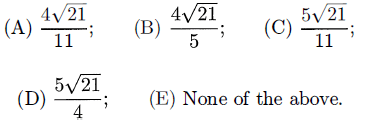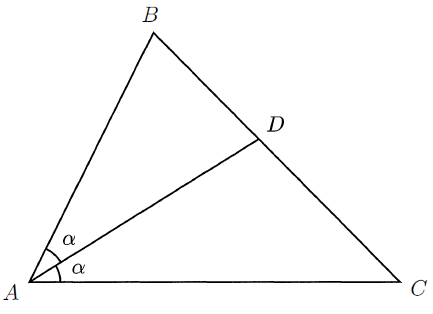SMO JUNIOR SECTION 2012 SOLUTIONS PART 3
Subscribe to our ▶️ YouTube channel 🔴 for the latest videos, updates, and tips.
Problem 7 :
Adam has a triangular field ABC with AB = 5, BC = 8 and CA = 11. He intends to separate the field into two parts by building a straight fence from A to a point D on side BC such that AD bisects ∠.BAC. Find the area of the part of the field ABD.

Solution :

Here AB = 5, BC = 8 and CA = 11
Area of triangle ABC :
Area of triangle ABD = (1/2) x AD x BD
sin α = BD/AB
BD = AB sin α
Area of triangle ADC = (1/2) x AD x DC
sin α = DC/AC
DC = AC sin α
Ratio between the triangles ABD and ADC :
Applying the values of BD and DC respectively in the area, we get
Area of triangle ABD/Area of triangle ADC
= [(1/2) x AD x AB sin α] / [(1/2) x AD x AC sin α]
= AB/AC
= 5/11
So, option D is correct.
Problem 8 :
For any real number x, let ⌊x⌋ be the largest integer less than or equal to x and x = x - ⌊x⌋. Let a and b be real numbers with b ≠ 0 such that
a = b⌊a/b⌋ - b{a/b}
which of the following is incorrect ?
(A) If b is an integer then a is an integer;
(B) If a is a non-zero integer then b is an integer;
(C) If b is a rational number then a is a rational number;
(D) If a is a non-zero rational number then b is a rational number;
(E) If b is an even number then a is an even number.
Solution :
The greatest integer function is a function that results in the integer nearer to the given real number. The greatest integer function rounds off the given number to the nearest integer.
Given :
a = b⌊a/b⌋ - b{a/b}
a = b⌊a/b⌋ - b{a/b}
(A) If b is an integer, then b⌊a/b⌋ = integer and b{a/b} = integer, then a is also integer.
(B) Let a be the integer and b be decimal, then (a/b) will be decimal, but ⌊a/b⌋ should be integer.
In b{a/b}, Obviously, b is not necessary an integer even if a is an integer.
So, option B is incorrect.
Problem 9 :
Given that

is an integer . Which of the following is incorrect?
(A) x can admit the value of any non-zero integer;
(B) x can be any positive number;
(C) x can be any negative number;
(D) y can take the value 2;
(E) y can take the value -2.
Solution :
If x > 0, for example x = 5
= |5 - |5|| / 5
= 0/5
= 0
If x < 0, for example x = -5
= |-5 - |-5|| / 5
= |-5 - 5| / (-5)
= |-10| / (-5)
= 10 / (-5)
= -2
Option D is incorrect, even we give the negative value, the numerator will become a positive and the denominator only will have negative sign. So, the final answer may be negative.
Why the value of x wouldn't be 0 :
Because the question says, y is a integer. Yes 0 is also an integer.
Problem 10 :
Suppose that A, B, C are three teachers working in three different schools X , Y, Z and specializing in three different subjects: Mathematics , Latin and Music . It is known that
(i) A does not teach Mathematics and B does not work in school Z;
(ii) The teacher in school Z teaches Music;
(iii) The teacher in school X does not teach Latin;
(iv) B does not teach Mathematics.
Which of the following statement is correct?
(A) B works in school X and C works in school Y;
(B) A teaches Latin and works in school Z;
(C) B teaches Latin and works in school Y;
(D) A teaches Music and C teaches Latin;
(E) None of the above.
Solution :
B does not teach math and does not work in Z. He may work in X or Y and may teach the subjects Latin or Music.
The teacher is school X does not teach Latin. So, teacher in the that school may teach math or latin.
Considering option A :
B works in X or Y and C also works in X or Y. anything is possible. But we cannot say surely.
Considering option B :
Teacher A should not work in school X. he may work in Y or Z.
Considering option C:
If B teaches Latin, then he should work in Y only, because he will not work in X.
The assignment is as follows:
A: in Z, teaches Music; B: in Y , teaches Latin; C: in X , teaches Mathematics
So, option C is correct.
Subscribe to our ▶️ YouTube channel 🔴 for the latest videos, updates, and tips.
Recent Articles
-
Finding Range of Values Inequality Problems
May 21, 24 08:51 PM
Finding Range of Values Inequality Problems -
Solving Two Step Inequality Word Problems
May 21, 24 08:51 AM
Solving Two Step Inequality Word Problems -
Exponential Function Context and Data Modeling
May 20, 24 10:45 PM
Exponential Function Context and Data Modeling